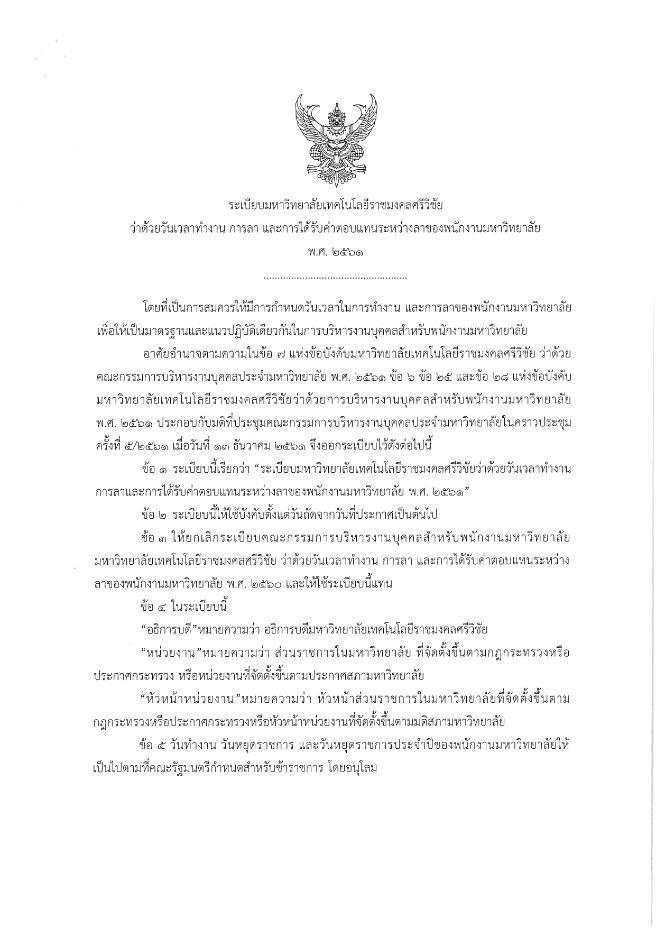Reporters: Mr.Konto Pantongkam, Asst.Dr.Pituk Bunnoon, Asst.Dr.Phatchakorn Areekul, Mr.Sutaporn Getpun
Evidence Date: December 1, 2022
Related SDGs:
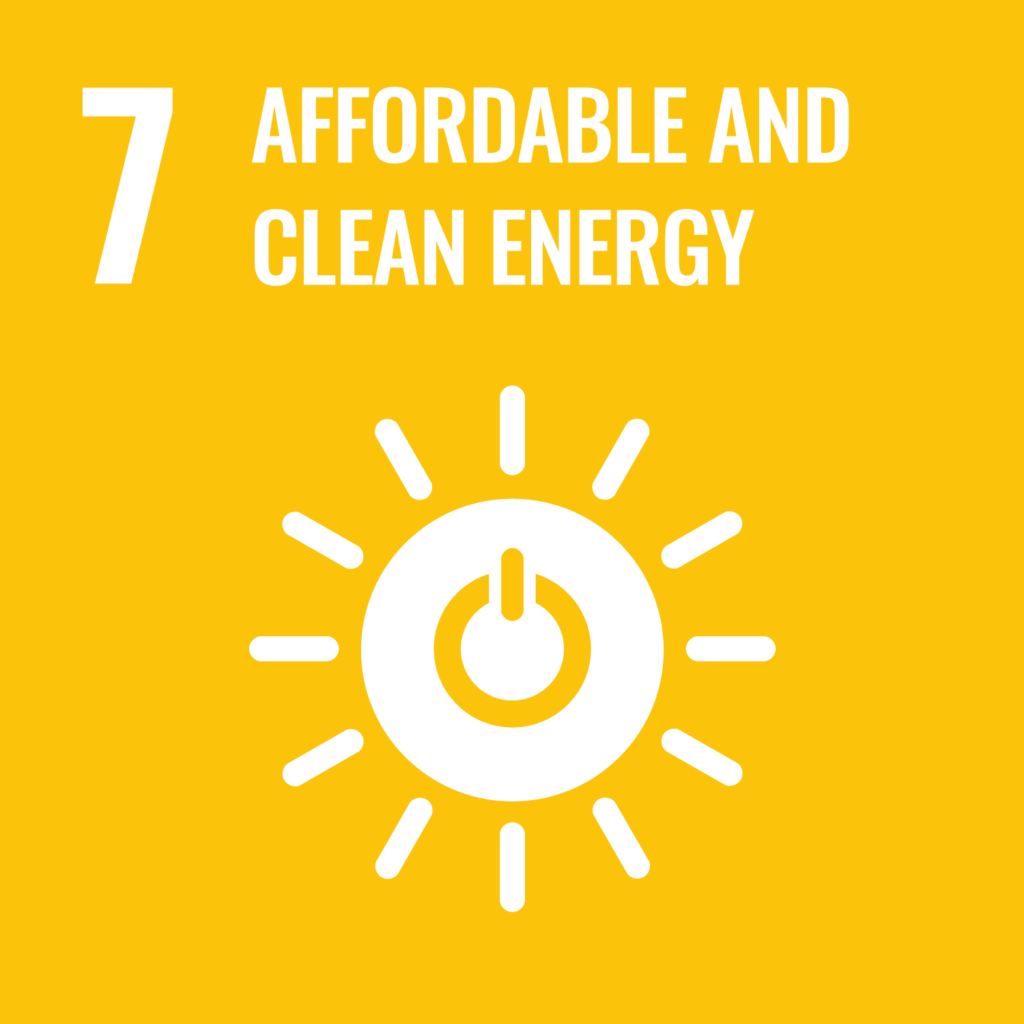
Related Indicators: 7.2.1, 7.2.2
Details: Supporting details and pictures
Rajamangala University of Technology Srivijaya (RUTS)
Policy on Environmental Management, Energy, Health, and Safety
RUTS is dedicated to becoming a Green University, fostering an environmentally friendly, livable campus, and serving as a sustainable model for the surrounding community and society. This policy is aligned with the university’s Long-Term Strategic Development Plan (2018-2038) and mandates the participation and awareness of all departments, staff, students, and stakeholders.
Six Core Policy Areas
1. Physical Environment (Setting & Infrastructure)
1.1. Space Planning: Review and develop a master plan for campus space utilization, ensuring specific area plans align with strategic objectives.
1.2. Green Spaces: Continuously support and promote the increase of green spaces across the university.
1.3. Ecosystem & Biodiversity: Manage perennial plants, conserve trees, and promote replanting and restoration of forests and degraded areas to enhance ecosystems and biodiversity.
1.4. Health & Safety Environment: Ensure departments manage a healthy and supportive environment that facilitates work, teaching, and learning, while guaranteeing appropriate safety and well-being for staff and students.
2. Energy and Climate Change
2.1. Energy Management System: Implement and develop an energy management system to reduce greenhouse gas (GHG) emissions effectively, ensuring all departments use energy efficiently and sustainably in compliance with the Energy Conservation Promotion Act and related regulations.
2.2. Energy Efficiency: Continuously improve energy efficiency by encouraging all units to reduce consumption through the upgrade of equipment to energy-saving devices, the utilization of technology and best practices, and the employment of renewable energy sources.
2.3. Innovation: Support and promote the development of energy-related innovations and best practices for conservation, GHG reduction, and renewable energy integration.
2.4. Renewable Energy Target: Increase the use of renewable energy sources on campus to at least 25% by 2026.
2.5. Green Buildings: Support the renovation and design of facilities (including Building Renovation and Passive Design) to create green, energy-saving, and smart buildings.
2.6. Carbon Neutrality Goal: Reduce the energy consumption index per person and lower GHG emissions across all activities, with the ultimate goal of achieving Carbon Neutral University status by 2037.
2.7. Public Awareness: Seriously and continuously publicize and promote energy conservation awareness among students, staff, and the general public.
3. Waste Management
3.1. Waste Reduction (3Rs): Support units in reducing waste generation and sorting municipal and hazardous waste based on the 3Rs principle: Reduce, Reuse, and Recycle. This includes minimizing the use of plastic and foam on campus.
3.2. System Development: Manage and develop systems to efficiently support the reduction, sorting, and end-to-end management of municipal and hazardous waste.
3.3. Zero Waste & Resource Utilization: Focus on waste and biomass management using a Zero Waste approach, and utilize waste and biomass for renewable energy conversion and the creation of eco-friendly products.
3.4. Wastewater Treatment: Manage, control, and develop an effective wastewater treatment system, ensuring water quality meets legal standards.
3.5. Wastewater Collection: Support the development of efficient wastewater collection systems to minimize contamination of university water sources.
3.6. Monitoring: Monitor and control the quality of wastewater from individual units and treated effluent.
3.7. R&D: Support research and development of technologies and innovations for managing all types of waste and wastewater.
3.8. Water Reuse: Support the reuse of treated wastewater.
3.9. Culture: Provide knowledge and promote activities to foster a culture of discipline, awareness, and sustainable waste management among all stakeholders and the surrounding community.
4. Water Management
4.1. Conservation: Promote the conservation of tap water, encouraging all units to reduce usage by upgrading fixtures to water-saving devices.
4.2. Reuse System: Establish a system to reuse treated wastewater for agricultural purposes as an alternative to tap water.
4.3. Reservoir Management: Implement an effective water management system covering surface water and water reserves for agriculture and potable water production.
4.4. Potable Water Quality: Ensure the management of potable water is of sufficient quality and quantity for university consumption.
4.5. Loss Reduction: Develop a plan to manage water loss by tracking consumption statistics and creating a database for unit usage.
4.6. Prohibition: Prohibit the disposal of waste or chemicals into university water sources.
5. Transportation Management
5.1. Vehicle Control: Limit the number of vehicles entering and exiting the university and establish controlled vehicle zones on campus.
5.2. Safety: Ensure effective traffic safety management.
5.3. Active Transport: Encourage units to promote cycling and walking for internal travel.
5.4. Pedestrian Prioritization: Limit parking spaces and controlled vehicle zones to actively promote walking between buildings.
6. Education, Research, and Safety Management
6.1. Curriculum: Support courses or short-term training programs related to the environment, energy conservation, and sustainability.
6.2. Research Funding: Provide research funding to support the publication of academic works and services that enhance sustainability and environmental knowledge.
6.3. Knowledge Dissemination: Organize knowledge dissemination, public awareness campaigns, and activities promoting environmental conservation, energy reduction, and efficient resource use (including GHG reduction and climate change preparation), aiming for at least two projects per semester per unit.
6.4. Awareness & Preparation: Units must manage knowledge dissemination, create awareness regarding environmental and energy conservation, and prepare staff, students, and the public for climate change impacts while developing green spaces.
6.5. Sustainable Procurement: Require that procurement processes consider or utilize environmentally friendly products (e.g., those with green labels, ISO 14000/ISO 26000 certification, or bio-economy products) that meet all industry standards.
6.6. Monitoring & Reporting: Unit managers must monitor, inspect, and submit monthly change reports to the university, along with an annual performance evaluation (by August each year).
6.7. Safety & Health: Promote and implement safety measures concerning the protection of life and property, university assets, staff health, wellness promotion, and prevention.
6.8. Budget Allocation: Allocate budgets specifically related to environmental sustainability and promote relevant initiatives.
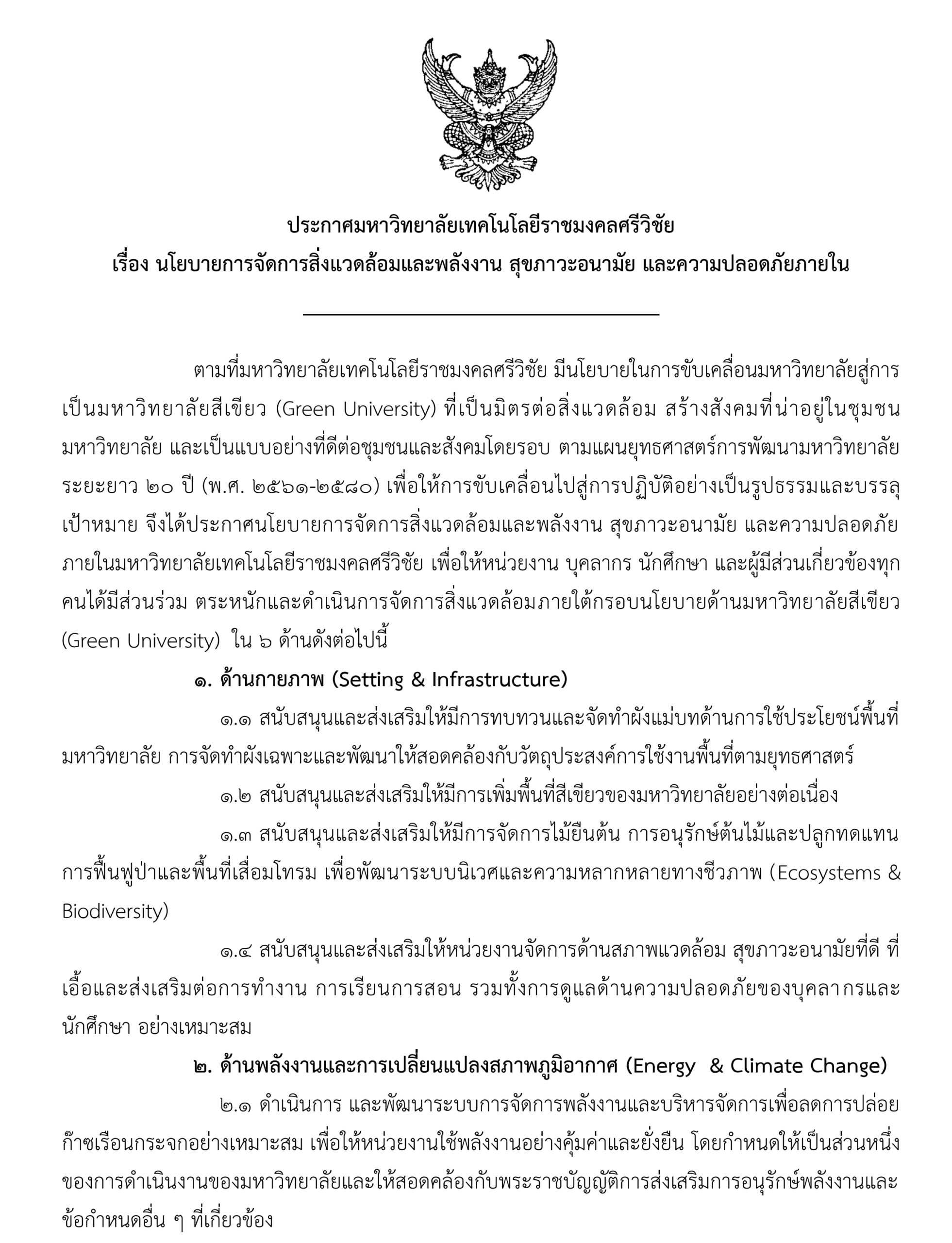
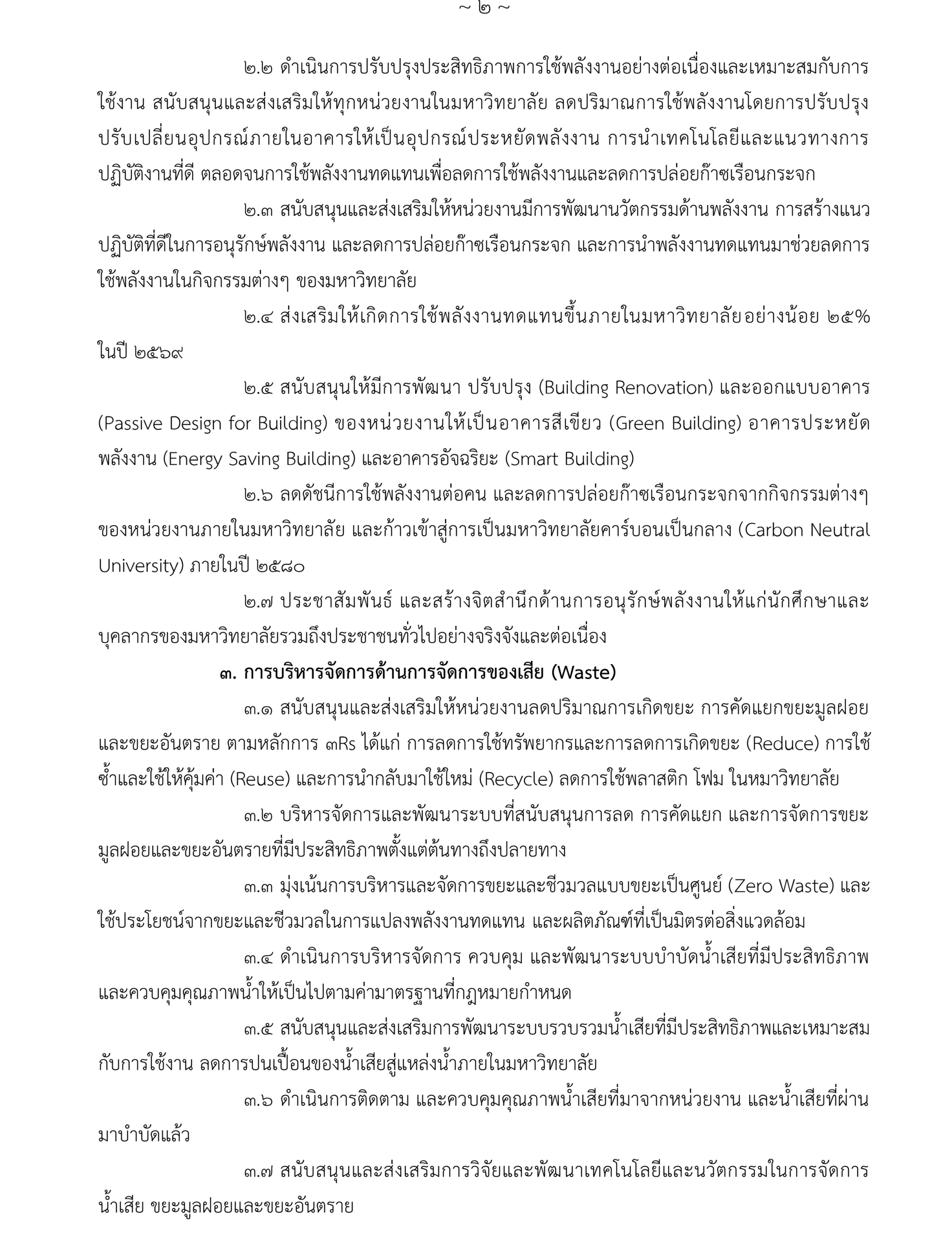
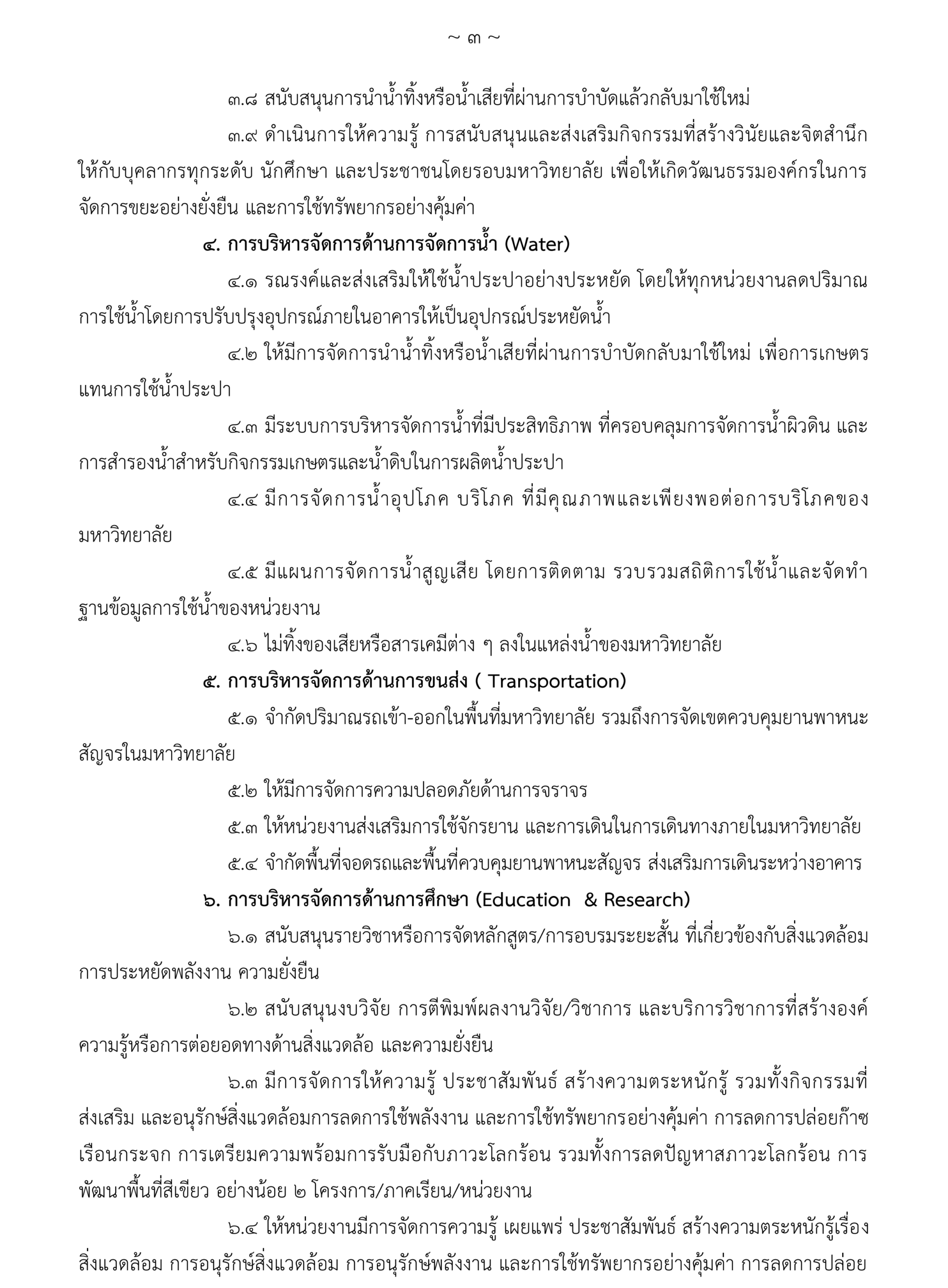
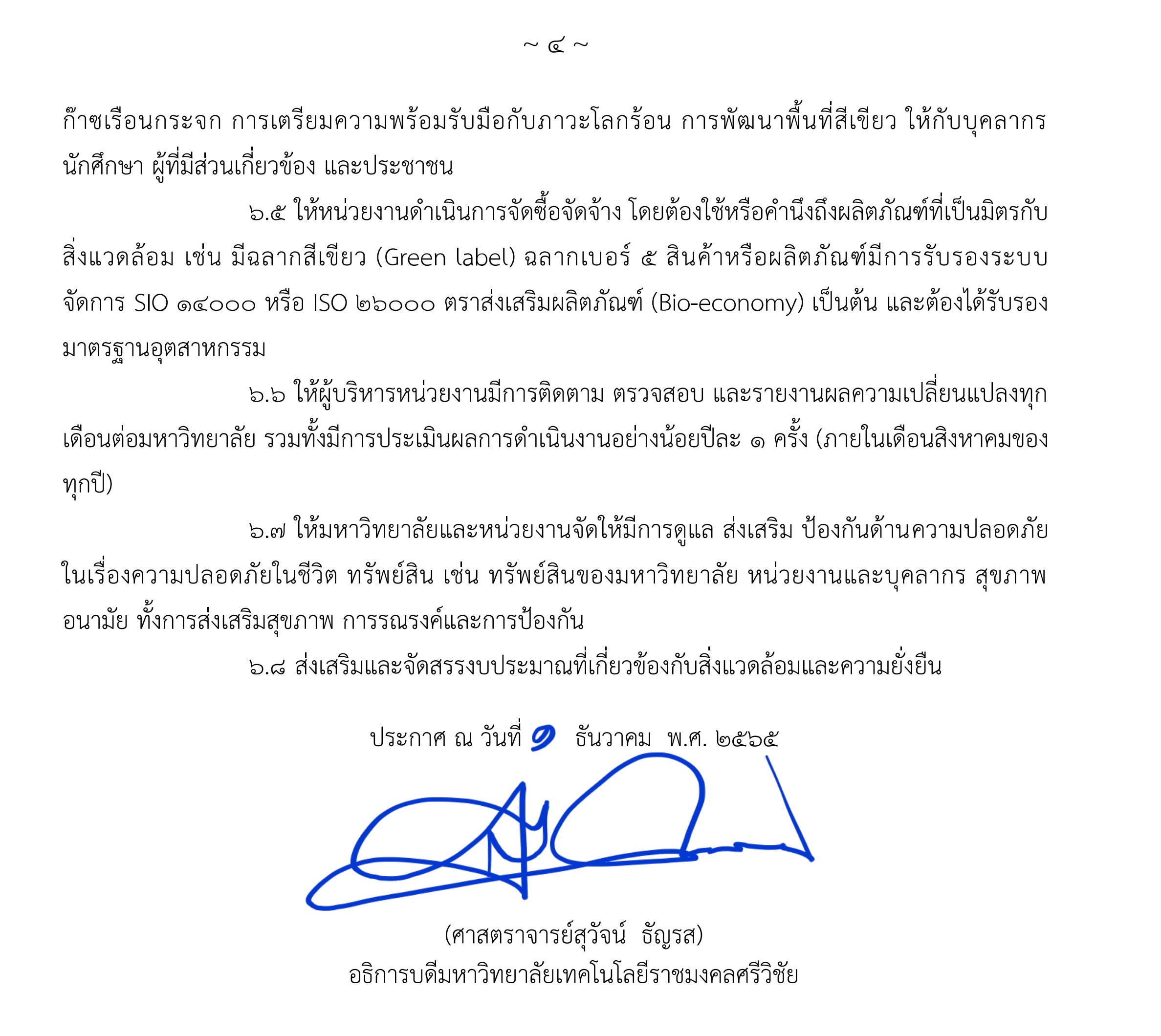
Related Links:

